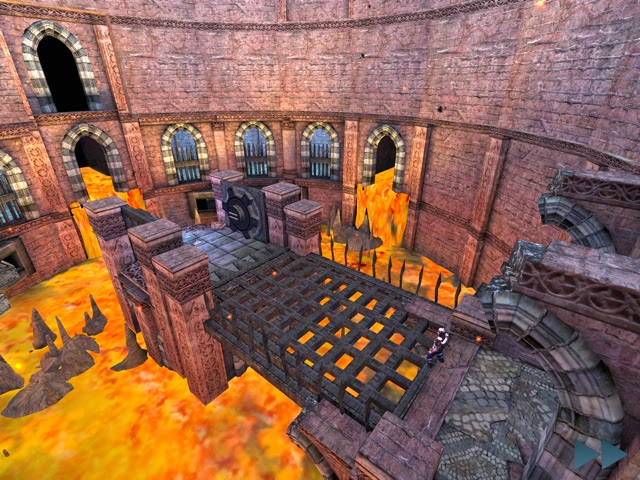To start with the most obvious observation, Horn is a visually stunning game. It is truly unbelievable that the this kind of graphic fidelity is possible in an iOS game. When played on an iPad air, it runs without so much as a hiccup and I never once encountered and crashing or freezing. The character models and animations for the main character (Horn) are fluid without seeming artificial. Often times, games may contain beautiful landscapes but facial models look awkward. In Horn, the facial modelling is exceptional. It would have been nice to have more humans to interact with for this quality alone. The landscapes and vistas are truly breathtaking. More than once I found myself just looking around to take in the scenery. Through the first third of the story, the colour palette of the environment appeared limited, but my the second act all fears were assuaged as the range of colours expands dramatically. The game spans three main environmental settings; dusk/fall, bright summer/sand, and sunny winter. The cutscenes in Horn are conveyed through sketch style artwork. Interestingly, this is contrary to our expectations where transitional scenes of canned animations are graphically impressive, but the gameplay is less so. In this case, the reverse is true, but it works extremely well to get across the storybook nature of Horn.
The music in Horn is also wonderful. The opening theme is memorable and sets a whimsical tone which suits the game well. As you progress through Horn, the music never fails to incorporate a new feeling with each area. The musical style usually feels Celtic, but there is enough variation to keep it interesting.One of the signature gameplay mechanics of the game is the use of the main characters musical instrument (a horn, duh). More on the gameplay mechanic in a minute, but from an auditory perspective it is very well done. The varied tones and sequences add a musical feel to the puzzle solving aspect of Horn.
Which brings us to Horn's Achilles heel; the gameplay. Horn is clearly a game inspired by the Zelda games, and as either an homage or due to a lack of creativity, follows that path closely. The main character follows the fairly linear environments and has to overcome obstacles such as yawning chasms, dense foliage, and unreachable heights. The tools at his disposal are his acrobatics, a grappling hook type arm weapon, and his aforementioned musical instrument. It has to be noted that this is a direct lift of the ocarina from the Zelda universe. Yet again, there is no creativity at work. Just stand in a certain spot, and the main character plays a pre-determined song. No thinking required. One would think that the puzzles that could be constructed based on these ingredients would be highly varied and interesting. However, the entire game is spent moving through the environments solving (using the term loosely) puzzles that incorporate one mechanic at a time. There is virtually no creativity in the puzzle design, and never did I feel challenged to think strategically or come up with solutions that had not been used previously. This makes playing the game a predictable trudge through each stage.
On the topic of predictable, the combat in Horn is a weak attempt to emulate other gesture based fighting games. Where games like Infinity Blade made this popular (and did it well), Horn's combat offers none of the dynamic strategy in the use of different weapon attacks, blocking, or magical attacks. What every battle boils down to is executing a dodge, slashing a few times, dodging, slashing a few times, and so on. The enemies never really pose much threat; some just take a minute or two longer to whittle away at. In most adventure games, the monsters you fight provide context to where you are in the story and offer interesting rewards upon defeat. Not so here, as the creatures encountered in the first stages of the game are nearly identical to ones encountered later on. There are no rewards for defeating an enemy, other than a meaningless "star" rating system. In the end, combat feels like an afterthought in overall game design.
The story told in Horn is likeable, and probably the only thing that kept me playing to the end. The "pygon curse" is moderately interesting, although this tale has been told in numerous other games (see any Zelda game). Carrying around a decapitated pygon head that offers insults, demotivational comments, and tries to promote the pygon lifestyle while you are working to end the curse is fairly humorous. While the story ushers you along in the game, areas are repeated with slightly different paths. This ends up adding to the already repetitive nature of the game.
Horn is a shame. It's a shame the gameplay designers didn't aim as high as the artists. If they had, this would have been an instant classic. As it stands, Horn offers a beautiful and charming experience that you will finish in spite of the derivative gameplay and lacklustre challenge.



No comments:
Post a Comment